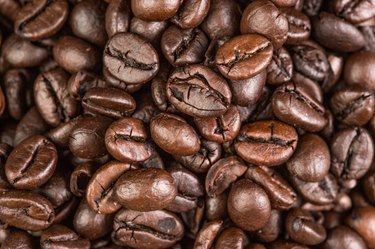
Coffee and indigestion may go hand-in-hand for some individuals. Coffee contains caffeine and other compounds that cause your stomach to produce more acid and may irritate its lining.
Tip
Drinking too much coffee or other caffeinated beverages may cause indigestion, advises the National Institute of Diabetes and Digestive and Kidney Diseases. Symptoms of indigestion may include bloating, burping, pain in the upper abdomen, nausea, gas and feeling overly full after eating.
Video of the Day
Coffee and Acid Reflux Myth
In addition to indigestion, you may also experience heartburn, or acid reflux. This occurs when the contents of your stomach come up into the esophagus. If the acid reflux is chronic, this is a condition called gastroesophageal reflux disease, or GERD, notes the National Institute of Diabetes and Digestive and Kidney Diseases.
Video of the Day
Some people believe that coffee causes acid reflux or GERD. While coffee and caffeine may trigger symptoms, researchers have not conclusively shown a link between coffee and GERD, advises Columbia University. GERD is caused by the weakening of the lower esophageal sphincter due to factors such as:
- Smoking
- Abdominal pressure caused by obesity or pregnancy
- Certain medications including asthma medicine, antihistamines and sedatives
In addition, coffee has not been linked to the development of ulcers or reflux esophagitis, or inflammation of the esophagus, notes a study in the June 2013 publication of PLOS One.
Warning
If you experience symptoms of GERD, be sure to contact your doctor to establish a treatment plan. Complications of GERD can be serious and may include lung conditions such as asthma and pneumonia, laryngitis, Barrett's esophagus or esophageal cancer.
Coffee and Heartburn Relief
You can generally treat indigestion and heartburn with over-the-counter antacids and by adjusting your diet. Avoid foods and drinks that may trigger heartburn. These may include:
- Caffeinated or carbonated beverages
- Alcohol
- Spicy foods
- Greasy or fatty foods
- High-acidity foods, such as tomatoes and oranges
Read more: The 10 Worst Foods for Acid Reflux
If you find that that coffee is a trigger for your heartburn, limit your consumption or avoid it altogether. Caffeine is one component in coffee that may cause nausea or heartburn, so consider switching to decaf to see if that lessens symptoms.
Note that if you drastically cut back or stop consuming caffeine, you may experience withdrawal symptoms including nausea, vomiting, headache and irritability, advises the U.S. National Library of Medicine.
If switching to decaf doesn't work and you simply must have coffee, the best coffee for acid reflux is ones with the lowest levels of compounds C5HT and chlorogenic acid which may irritate your stomach lining. Columbia University notes that dark roasts typically have lower levels of these compounds than light roasts.
You can also try switching to cold brew coffee. A study published in the October 2018 issue of Scientific Reports found that the concentration of acidic compounds is lower in cold-brewed coffee compared to hot-brewed coffee.
Read more: Does Coffee Irritate Stomach Ulcers?
Warning
Contact your doctor if your heartburn or indigestion do not improve. Seek immediate medical attention if you experience symptoms such as:
- Excessive or frequent vomiting
- Bloody vomit
- Black stools
- Yellow skin or eyes
- Severe abdominal pain
- Shortness of breath
- Difficult or painful swallowing
- National Institute of Diabetes and Digestive and Kidney Diseases: "Symptoms & Causes of Indigestion"
- National Institute of Diabetes and Digestive and Kidney Diseases: "Acid Reflux (GER & GERD) in Adults"
- Columbia University: "Coffee's Got Me Feeling Nauseous — What Gives?"
- PLOS One: "No Association of Coffee Consumption With Gastric Ulcer, Duodenal Ulcer, Reflux Esophagitis, and Non-Erosive Reflux Disease: A Cross-Sectional Study of 8,013 Healthy Subjects in Japan"
- U.S. National Library of Medicine: "Caffeine in the Diet"
- Scientific Reports: "Acidity and Antioxidant Activity of Cold Brew Coffee"